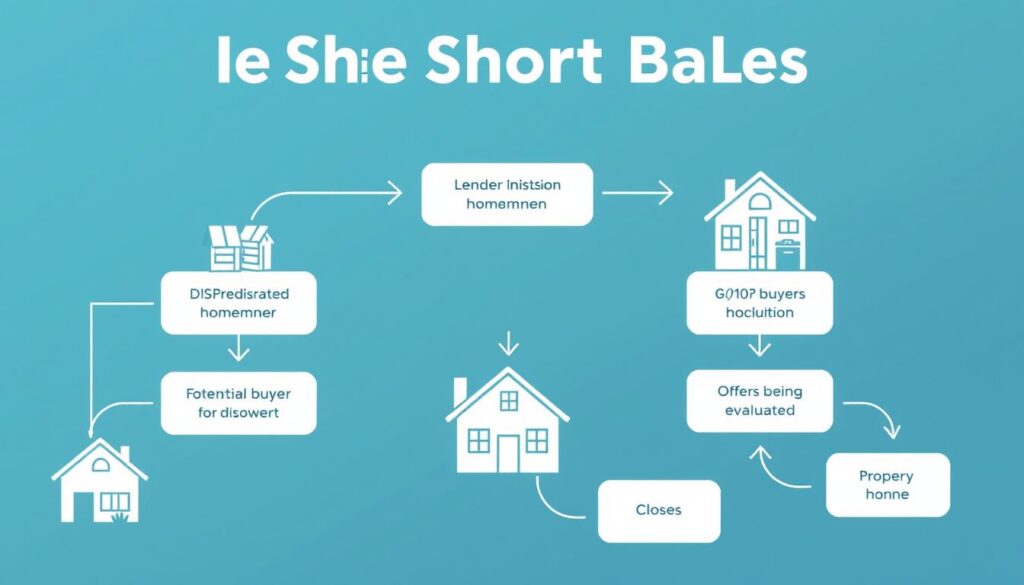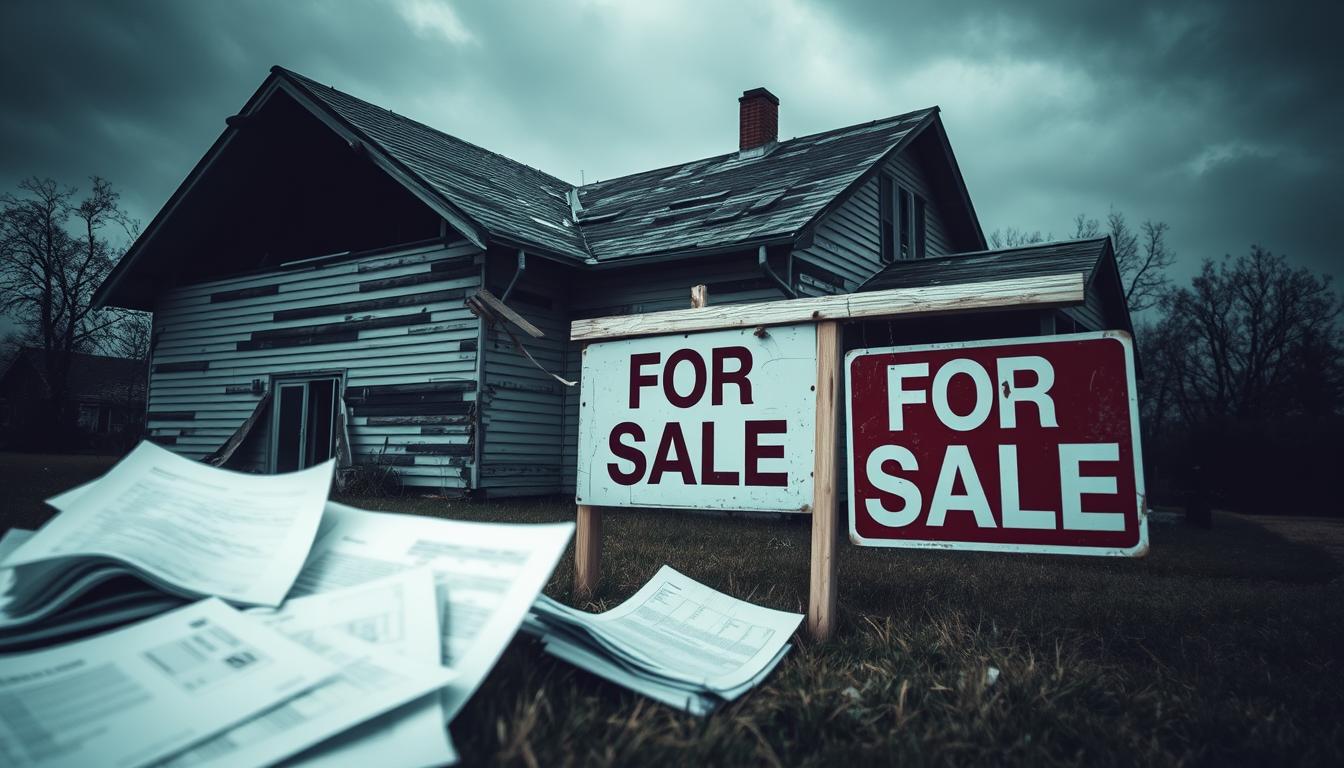Ever wondered how homeowners in tough financial spots can dodge foreclosure’s long-term effects? The key often lies in the short sale definition. A short sale happens when a house is sold for less than the mortgage debt. It’s a way for homeowners to protect their future when they can’t afford their mortgage.
Unlike regular sales, a short sale needs the lender’s okay. It can take up to a year to finish, but it’s often better than foreclosure. This guide will explore short selling in detail, including its process, benefits, and how it affects credit compared to foreclosure. Learning about short sales is key for anyone in today’s changing real estate world.
Key Takeaways
- A short sale allows homeowners to sell their property for less than the mortgage owed.
- Homeowners typically seek short sales to avoid foreclosure and its long-term repercussions.
- Lender approval is a crucial aspect of the short sale process.
- Short sales were more common during the Great Recession compared to today’s market.
- The average time for completing a short sale transaction can range significantly, often taking up to a year.
- Short sales might impact a borrower’s financial recovery differently than foreclosures.
- Homeowners can sometimes be liable for the difference between the mortgage and sale price.
Understanding Short Sales
A short sale happens when a homeowner sells their house for less than what they owe on the mortgage. This usually happens when someone is going through tough financial times or when house prices drop. Knowing about short sales starts with understanding what they are and why lenders play a big role in them.
Definition of a Short Sale
A short sale is when a homeowner and a lender agree to sell a house for less than the mortgage. This is often chosen over foreclosure, which can take a long time. To start a short sale, the homeowner must show they can’t pay the mortgage and get the lender’s okay.
Indicators for Short Sales
There are signs that might mean it’s time for a short sale. These include trouble making mortgage payments, a big drop in house value, or needing to move for a new job. Spotting these signs early can help avoid foreclosure and protect credit scores.
The Importance of Lender Approval
Getting the lender’s okay is key in a short sale. Without it, the sale can’t happen. Sellers need to provide detailed financial info for the lender to review. This shows how important lender approval is in short selling explained. Without it, homeowners might face foreclosure, making careful planning crucial.
What Is Short Sale Mean
A short sale is a way for homeowners in tough financial spots. It’s when a homeowner sells their house for less than what they owe on the mortgage. This helps them avoid foreclosure and lets the lender have a say in the sale.
Homeowners facing foreclosure might choose this option. It’s a last resort, especially if they’ve lost their job or faced a disaster. Short sales can take longer than regular sales because lenders need to agree.
Lenders might forgive the remaining loan balance, but they can still go after the borrower for the difference. Short sales can hurt your credit score, but not as much as foreclosure. Foreclosures can make it hard to get another mortgage for seven years. Short sales, however, might only keep you waiting two years.
| Aspect | Short Sale | Foreclosure |
|---|---|---|
| Time Frame | Typically longer due to lender approval | Usually faster, around 120 days |
| Credit Impact | Less severe | More severe, lasting longer |
| Homeowner Involvement | Engaged throughout the process | Less involvement once initiated by the lender |
| Potential for Future Purchases | May qualify for a mortgage after 2 years | Typically, a 7-year wait |
| Debt Forgiveness | Possible, but may include deficiency judgments | Foreclosure may lead to more financial liability |
Short Sale Process
The short sale process can seem daunting, but understanding it helps. It clarifies things for homeowners and buyers. Knowing the steps and challenges makes it easier.
Step-by-Step Procedure
The short sale process has several key stages. It starts with assessing the situation and ends with closing the sale:
- Evaluate the Situation: Homeowners must check their finances and decide if a short sale is needed.
- Contact the Lender: Homeowners should tell their lender about their financial troubles and ask for short sale approval.
- Prepare Documentation: A detailed financial package, including hardship letters and income proof, is given to the lender.
- Set an Asking Price: The home is listed at a price that’s competitive but also considers mortgage and selling costs.
- Find a Buyer: After listing, potential buyers see the property, and offers are made and reviewed.
- Lender Negotiations: The lender looks at all offers, which might lead to more talks or requests for more info.
- Close the Sale: When the lender approves the sale, the deal is finalized, and money goes to the lender.

Challenges Faced During the Process
Homeowners face many challenges during a short sale. These include:
- Sluggish Lender Responses: Banks can take over a month to say they got the short sale files.
- Increased Paperwork: Homeowners often have to deal with a lot of paperwork, which can be frustrating.
- Uncertainty with Buyer Offers: The chance of getting an offer accepted varies, and low offers or mistakes can mean rejection.
- Delayed Approvals: Lenders can take two to eight weeks, or even longer, to approve a sale, making the whole process slow.
Dealing with these delays and paperwork can be emotionally tough. Knowing these challenges helps homeowners prepare better and plan their strategy.
Advantages of a Short Sale
Understanding the benefits of a short sale is key for sellers and buyers today. This process helps sellers deal with financial troubles and offers buyers a chance to find affordable homes.
Benefits for Sellers
Sellers can avoid foreclosure with a short sale, which is a big plus. This choice helps keep their credit score better than foreclosure. After a short sale, they can buy a new home in two years, not seven like after foreclosure.
Another good thing is that sellers can settle their loans with lenders. This means they don’t have any debt left. The process is more controlled, avoiding the bad effects of foreclosure. Sellers might even get cash incentives. Starting the short sale quickly helps avoid delays that can make things harder.
Benefits for Buyers
Buyers can find great deals on short-sale properties. These homes are often priced well, making them attractive. With fewer bidders, buyers have a better chance of getting their offer accepted.
Short sales also have a faster approval time, usually 30-90 days. This is quicker than foreclosures. Since the current owners take care of the property, buyers can feel more confident about their purchase.

| Aspect | Short Sale | Foreclosure |
|---|---|---|
| Impact on Credit Score | Less severe impact | More severe impact |
| Timeline to Purchase Again | As little as 2 years | At least 7 years |
| Debt After Sale | No outstanding debt | Potential for remaining debt |
| Property Condition Oversight | Owner-occupied maintenance | Variable condition |
| Buyer’s Market Competition | Less competition | Higher competition |
Short Sale vs Foreclosure
It’s important to know the difference between short sale and foreclosure if you’re struggling financially. A short sale lets you sell your home for less than what you owe on the mortgage. Foreclosure, on the other hand, is when the lender takes your home after you miss payments. This shows that short sales give homeowners more control, while foreclosures take it away.
Differences Between the Two
Short sales and foreclosures differ in how they affect your home and the selling process. Homes in short sales are usually in better shape than those in foreclosures. The short sale vs foreclosure debate shows the emotional and financial stress on homeowners. Short sales need lender approval and can take months, while foreclosures happen faster, based on state laws.
Impact on Credit
The credit impact is a key difference between short sale and foreclosure. Foreclosure can hurt your credit for seven years, making it hard to get loans or buy another home for five years. Short sales, however, have a less severe effect on credit. They might show up as “settled” on your credit report, helping you recover faster. Understanding these effects is crucial for making the right choice for your financial future.
Conclusion
Knowing what a short sale means is key for buyers and homeowners in trouble. It lets sellers avoid foreclosure and buyers get deals on homes. The short sale process has its challenges, like tough negotiations and delays. But, with the right help, these can be overcome.
For homeowners in financial trouble, short sales can be better than foreclosure. They help avoid bad credit and let buyers find homes at lower prices. Doing your homework and getting advice can make a short sale work well for you.
If you need cash fast, consider real estate investors who buy any property. Short sales can be good for both sides if you know how to do it right.






